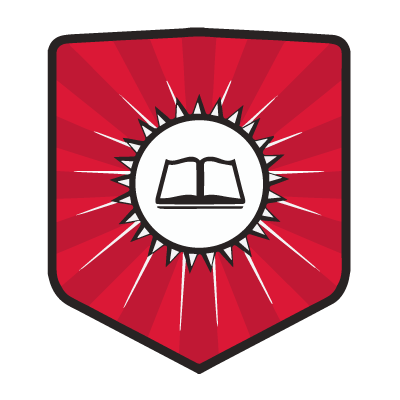Design & Technology

High- quality design and technology education makes an essential contribution to the creativity,culture, wealth and well-being of the nation"
Intent:
Here at St Saviour's School, we aim to deliver the Design and Technology curriculum with both a practical and creative approach. The children solve real life problems within a variety of contexts, using a cross curricular approach incorporating mathematics, science, ICT and art. These experiences encourage the children to become resourceful, innovative, and enterprising. The national curriculum for Design Technology aims to ensure that all pupils:
![]() Develop the creative, technical and practical expertise needed to perform everyday tasks confidently and to participate successfully in an increasingly technological world.
Develop the creative, technical and practical expertise needed to perform everyday tasks confidently and to participate successfully in an increasingly technological world.
![]() Critique, evaluate and test their ideas and products and the work of others.
Critique, evaluate and test their ideas and products and the work of others.
![]() Understand and apply the principles of nutrition and learn how to cook.
Understand and apply the principles of nutrition and learn how to cook.
![]() Build and apply the principles of nutrition and learn how to cook.
Build and apply the principles of nutrition and learn how to cook.
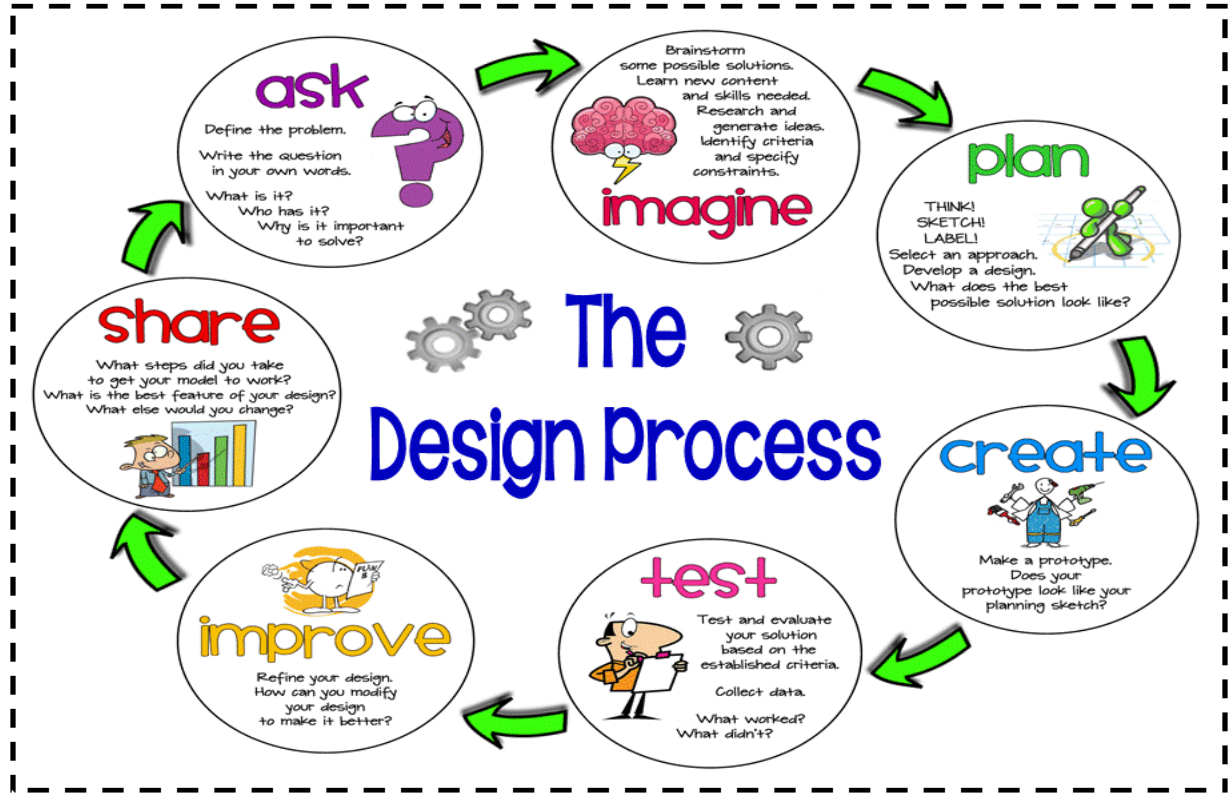
Implementation:
The Design Technology National Curriculum is planned for and covered in full within the EYFS, KS1 and KS2 school curriculum. Whilst the National Curriculum forms the foundation of our curriculum, we make sure that children learn additional skills, have a depth and breadth of knowledge and understanding and enhance our curriculum as and when necessary.
EYFS
During the Early Years Foundation Stage, the essential building blocks of children’s design and technology capability are established. There are many opportunities for carrying out D&T-related play activities in all areas of learning.
Initially children investigate, explore and have a go. As time goes on they are expected to be more active learners and keep going when they encounter difficulty, until they are developing their own ideas and thinking critically. Specifically, ‘Designing and Making’ is identified and assessed as a strand within Expressive Art and Design and links closely to Art. By the end of the EYFS, most children should be able to:
![]() Construct with a purpose in mind, using a variety of resources
Construct with a purpose in mind, using a variety of resources
![]() Use simple tools and techniques competently and appropriately
Use simple tools and techniques competently and appropriately
![]() Build and construct with a wide range of objects, selecting appropriate resources and adapting their work when necessary.
Build and construct with a wide range of objects, selecting appropriate resources and adapting their work when necessary.
![]() Select the tools and techniques they need to shape, assemble and join materials they are using.
Select the tools and techniques they need to shape, assemble and join materials they are using.
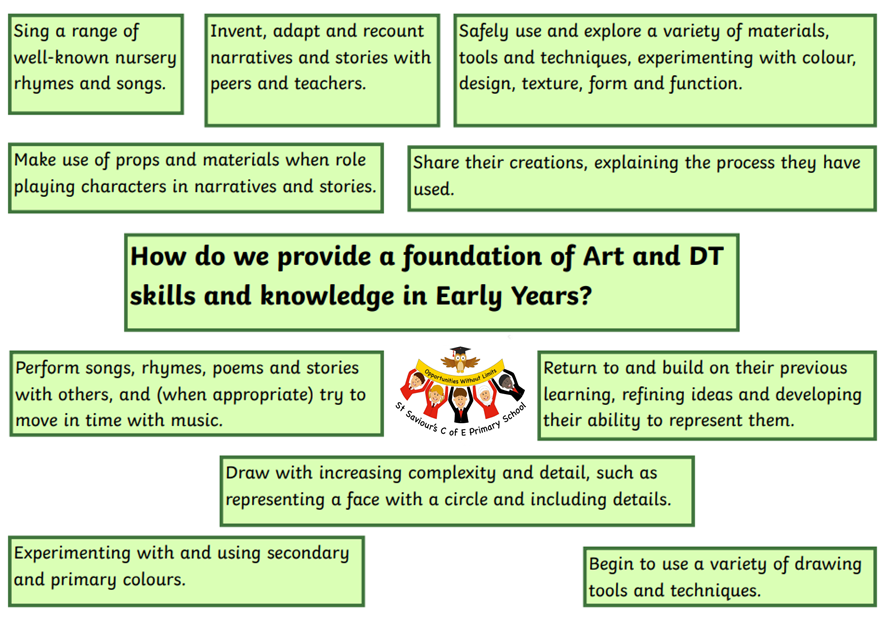
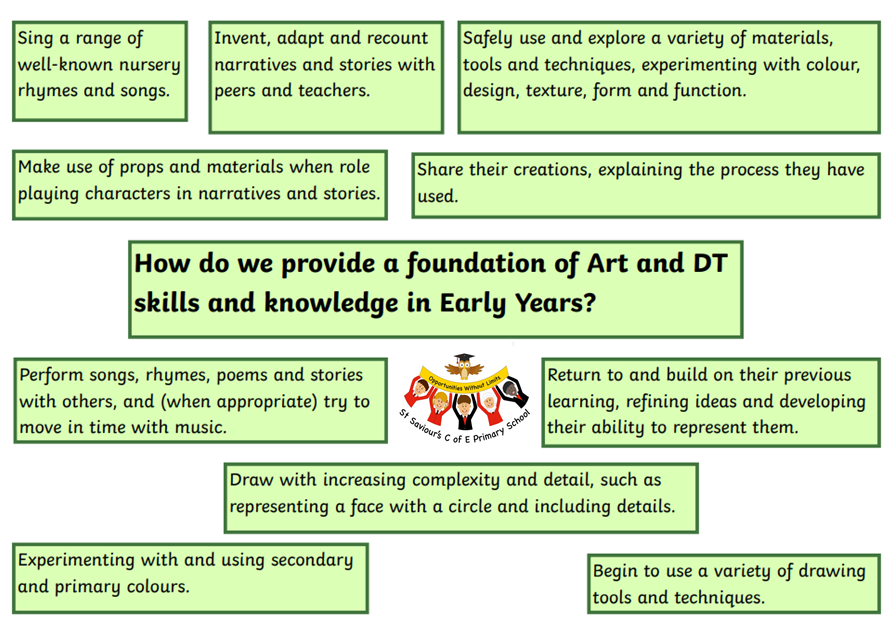
KS1 & KS2
For pupils in Key Stage One and Key Stage Two, we have chosen to teach DT by using the Kapow scheme of work. Kapow is a clear and comprehensive scheme of work in line with the National Curriculum.
This ensures there is a progression of skills and consistency of approach across the school whilst also ensuring that teachers and pupils are supported in developing skills and subject knowledge.
Kapow offers full coverage of the KS1 and KS2 Design & Technology curriculum and we have categorised our content into six areas:
1) Structures
2) Mechanisms
3)Electrical Systems
4) Cooking and Nutrition
5)Textiles
6) Digital World
There are then 4 strands that run through each topic: - Design - Make - Evaluate - Technical Knowledge
![]() A range of skills will be taught ensuring that children are aware of health and safety issues related to the tasks undertaken
A range of skills will be taught ensuring that children are aware of health and safety issues related to the tasks undertaken
![]() Clear and appropriate cross-curricular links underpin learning in multi areas across the curriculum giving the children opportunities to learn life skills and apply skills to ‘hands on’ situations in a purposeful context.
Clear and appropriate cross-curricular links underpin learning in multi areas across the curriculum giving the children opportunities to learn life skills and apply skills to ‘hands on’ situations in a purposeful context.
![]() Independent learning: In design technology children may well be asked to solve problems and develop their learning independently. This allows the children to have ownership over their curriculum and lead their own learning in Design Technology.
Independent learning: In design technology children may well be asked to solve problems and develop their learning independently. This allows the children to have ownership over their curriculum and lead their own learning in Design Technology.
![]() Collaborative learning: In design and technology children may well be asked to work as part of a team learning to support and help one another towards a challenging, yet rewarding goal.
Collaborative learning: In design and technology children may well be asked to work as part of a team learning to support and help one another towards a challenging, yet rewarding goal.

SEND
We seek to inspire all our children, promoting their interests and developing their knowledge and skills. Design and Technology is a subject where children of all abilities can showcase their creativity and skills. The Kapow scheme includes differentiated guidance for every lesson should it be required.
Curriculum Links
Our Design and Technology curriculum enables children to develop knowledge and skills that are transferable to other curriculum areas such as Maths, English and Science. For instance, measuring and sawing wood, drawing labelled diagrams and seeing forces in action. There are many opportunities for children to practise technological skills through Forest School, such as building structures, using pulleys and preparing and cooking soup.
Vocabulary
The Kapow scheme of work includes a comprehensive list of key facts and vocabulary that are to be taught in each unit. Our children are encouraged to use specifically designed knowledge organisers where they can record key facts that they have learnt and definitions of vocabulary.
Design is a funny word. Some people think design means how it looks. But of course, if you look deeper, it's really how it works.
– Steve Jobs
Impact:
![]() Our carefully structured DT curriculum provides opportunities additional to the National Curriculum endpoints, to build cultural capital and, through exposure in DT lessons to life-skills such as innovation and entrepreneurship.
Our carefully structured DT curriculum provides opportunities additional to the National Curriculum endpoints, to build cultural capital and, through exposure in DT lessons to life-skills such as innovation and entrepreneurship.
![]() Children at St Saviours will become inquisitive, reflective learners who are enthusiastic about DT. They will be able to share their DT knowledge and demonstrate their skills. DT enables children to gain a deeper understanding of the world that we live in and the role creativity has to play in the future of our planet.
Children at St Saviours will become inquisitive, reflective learners who are enthusiastic about DT. They will be able to share their DT knowledge and demonstrate their skills. DT enables children to gain a deeper understanding of the world that we live in and the role creativity has to play in the future of our planet.
![]() They will have clear enjoyment and confidence in design and technology that they will then apply to other areas of the curriculum.
They will have clear enjoyment and confidence in design and technology that they will then apply to other areas of the curriculum.
![]() Our children will ultimately know more, remember more and understand more about Design Technology, demonstrating this knowledge when using tools or skills in other areas of the curriculum and in opportunities out of school. As designers, children will develop skills and attributes they can use beyond school and into adulthood.
Our children will ultimately know more, remember more and understand more about Design Technology, demonstrating this knowledge when using tools or skills in other areas of the curriculum and in opportunities out of school. As designers, children will develop skills and attributes they can use beyond school and into adulthood.
At St Saviours we know our children are doing well by:
1) Engaging in lessons which are planned using the skills progression document and prior learning.
2) Marking and feedback
3) Photographic evidence
4)Displays of work
5)Looking at the final product
6) Book scrutiny and pupil voice
Curriculum Overviews:
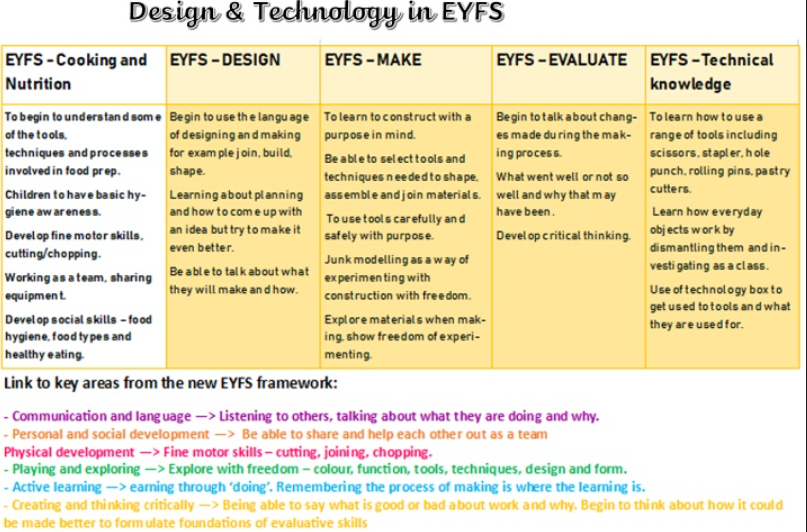
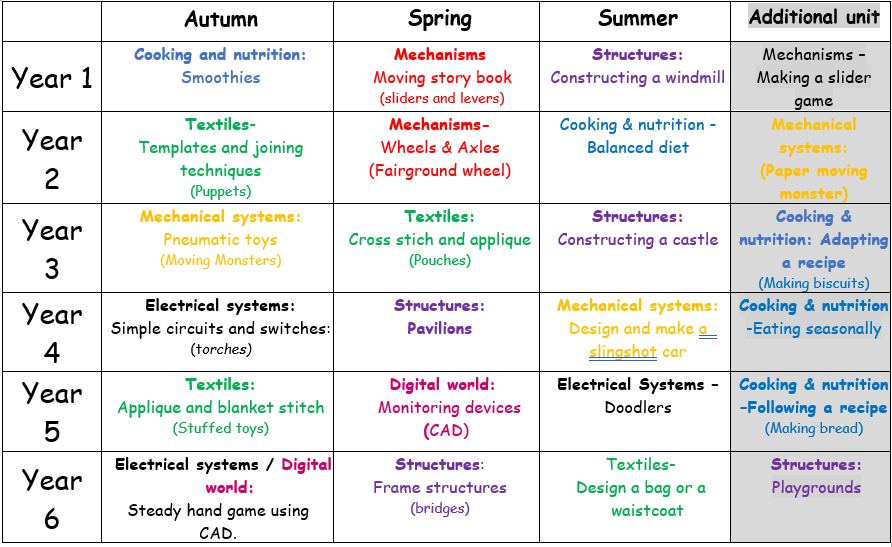
"Design and Technology gives children the opportunity to develop skills, knowledge and understanding of designing and making functional products. It is vital to nurture creativity and innovation through design, and by exploring the designed and made world in which we all live and work."
DT Association
